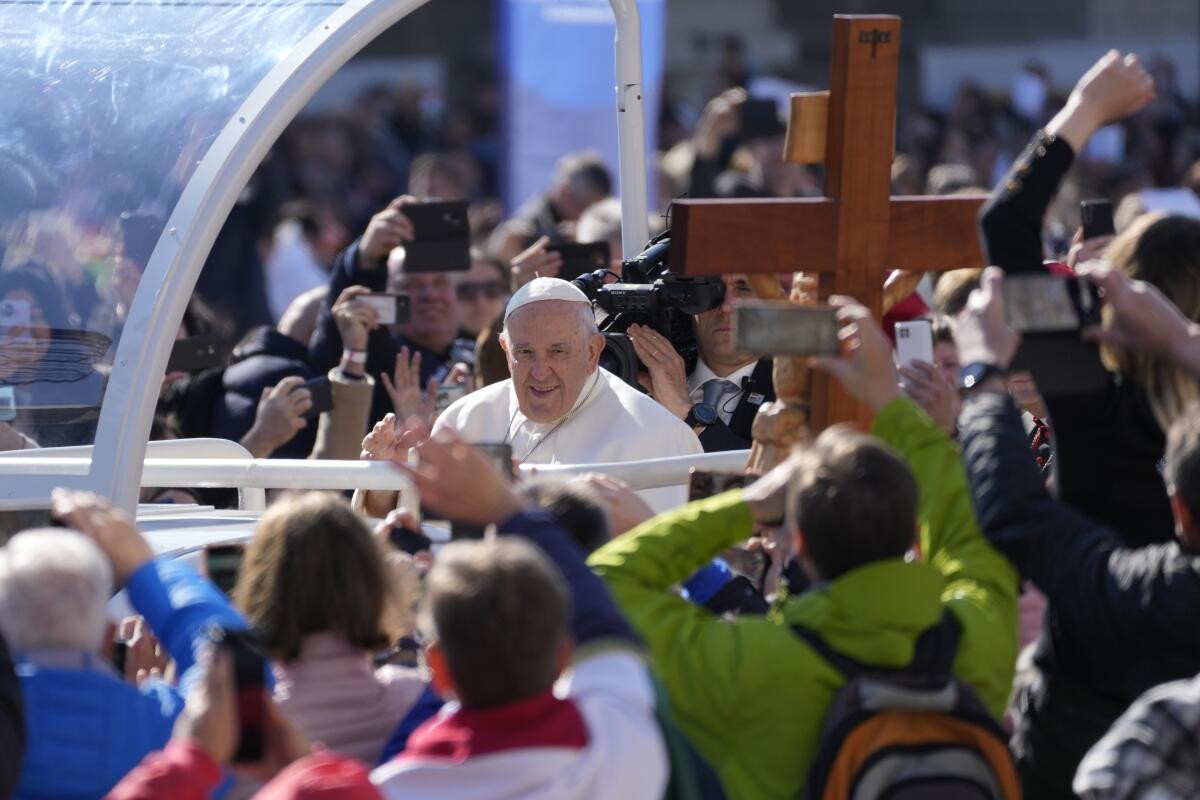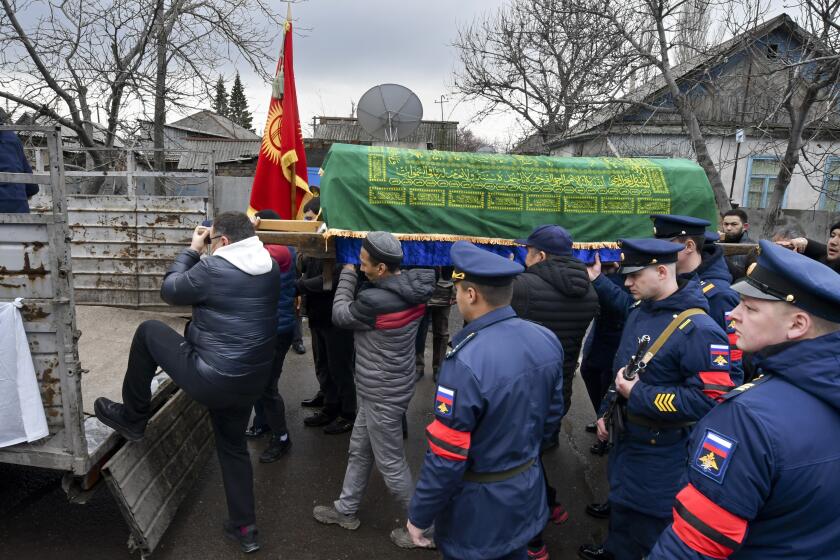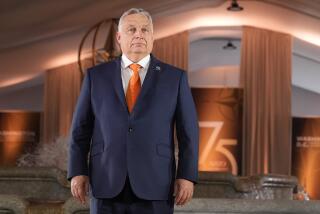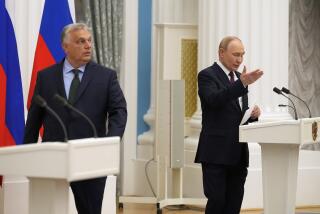In final Mass in Budapest, pope urges Hungary to open doors

- Share via
BUDAPEST, Hungary — Pope Francis on Sunday urged Hungarians to open their doors to others, as he wrapped up a weekend visit with a plea for Europe to welcome migrants and the poor and for an end to Russia’s invasion of Ukraine.
Francis issued the appeal from the banks of the Danube River as he celebrated Mass at Budapest’s Kossuth Lajos Square, with the Hungarian Parliament and Chain Bridge as a backdrop.
Citing local organizers, the Vatican said some 50,000 people attended the Mass, more than 30,000 of them in the square, on a sunny morning. Among them were President Katalin Novak and right-wing populist Prime Minister Viktor Orban, whose lukewarm support for Ukraine has rankled fellow European Union members.
Francis has expressed appreciation for Hungary’s welcome of Ukrainian refugees. But he has challenged Orban’s hard-line anti-immigration policies, which in 2015-16 included building a razor-wire fence on the border with Serbia to stop people from entering. Francis urged Hungary and Europe as a whole to welcome those who are fleeing war, poverty and climate change, calling for safe and legal migration corridors.
“How sad and painful it is to see closed doors,” Francis said in his homily Sunday on the Danube. “The closed doors of our selfishness with regard to others; the closed doors of our individualism amid a society of growing isolation; the closed doors of our indifference toward the underprivileged and those who suffer; the doors we close toward those who are foreign or unlike us, toward migrants or the poor.
“Please, let us open those doors!” he said.
Kyrgyzstan citizens working in Russia are being drafted into its military. Some flee back home to avoid the Ukraine war. Others return in body bags.
At the end of the Mass, Francis prayed for peace in Ukraine and “a future of hope, not war; a future full of cradles, not tombs; a world of brothers and sisters, not walls.”
The 86-year-old pope has tried to forge a diplomatic balancing act in his pleas to end Russia’s war, expressing solidarity with Ukrainians while keeping the door open to dialogue with Moscow. On Saturday, he prayed with Ukrainian refugees, then met with an envoy of Russian Orthodox Patriarch Kirill, who has supported Moscow’s invasion and justified it as a metaphysical battle against the liberal West.
Francis kissed the cross of Metropolitan Hilarion in a sign of respect for the Russian Orthodox Church during what the Vatican said was a “cordial” 20-minute meeting at the Holy See’s embassy in Budapest. Hilarion, who developed good relations with the Vatican as the Russian church’s longtime foreign minister, said he briefed Francis on his work as the Moscow Patriarchate’s representative in Budapest.
Hilarion attended Francis’ Sunday Mass, as did representatives of Hungary’s other Christian churches and Jewish community, Vatican News said.
Later, during an airborne press conference en route home, Francis said the Vatican was willing to help facilitate the return of Ukrainian children taken to Russia during the war, saying the Holy See had helped mediate prisoner exchanges and would do “all that is humanly possible” to reunite families.
“All human gestures help. Gestures of cruelty don’t help,” Francis said.
Francis also revealed that a secret peace “mission” is underway. He gave no details when asked whether he spoke about peace initiatives during his talks with Orban in Budapest.
“I’m available to do anything,” Francis said. “There’s a mission that’s not public that’s underway; when it’s public, I’ll talk about it.”
The International Criminal Court last month issued an arrest warrant for Russia’s president, Vladimir Putin, and its children’s commissioner, accusing them of war crimes for abducting children from Ukraine. Russia has denied wrongdoing, contending that the children were moved for their safety.
Francis also said talks are underway to return colonial-era artifacts in the Vatican Museums that were acquired from Indigenous peoples in Canada and voiced a willingness to return other problematic objects in the Vatican’s collection on a case-by-case basis.
“The Seventh Commandment comes to mind: If you steal something, you have to give it back,” he said during the press conference.
Francis’ visit to Hungary, his second in as many years, brought him as close as he’s been to the Ukrainian front but also to the heart of Europe, where Orban’s right-wing Christian government has cast itself as a bulwark against a secularizing Western world.
Francis, though, used the visit to call for the continent to find its spirit of unity and purpose, referencing Budapest’s bridges across the Danube as symbols of unity and connection.
The site for his final Mass couldn’t have been more appropriate: The square is named for one of Hungary’s most famous statesmen, who served as the first prime minister after the 1848-49 revolution against Habsburg rule. It is separated from the left bank of the Danube by Hungary’s neo-Gothic parliament, the country’s largest building and home of its National Assembly. Nearby is the Chain Bridge, one of several bridges linking the Pest and Buda sides of the city.
Sister Marta, a nun of Hungarian origin from Brazil who attended the Mass, said she hoped Francis’ message of welcome would be heard in Hungary.
“We [Brazilians] have gotten accustomed to openness toward others, and we hope that Hungary as well will open in this direction,” she said.
But Budapest resident Erno Sara said the country is fine as it is.
“I don’t know if we [Hungarians] need to change. There is nothing at all in this country that is out of the ordinary, any kind of behavior that we would have to change,” Sara said.
In his final event in Hungary, Francis warned against the dangers of technology dominating human life, during a speech Sunday at Pazmany Peter Catholic University. Speaking broadly about Europe’s future, Francis said culture and scholarship forged by universities are the antidote to a future dictated by technology.
The university, he said, “is a temple where knowledge is set free from the constraints of accumulating and possessing and can thus become culture.” Such a culture cultivates “our humanity and its foundational relationships: with the transcendent, with society, with history and with creation.”
More to Read
Sign up for Essential California
The most important California stories and recommendations in your inbox every morning.
You may occasionally receive promotional content from the Los Angeles Times.











